The Ultimate Foundation of Economic Science
Category: ludwig von mises

In this volume, Mises argued that economics is a science because human action is a natural order of life and that it is the actions of humans that determine markets and capital decisions. Ludwig von Mises (1881–1973) was the leading spokesman of the Austrian School of economics throughout most of the twentieth century. Since Mises believed these links could be proven scientifically, he concluded that economics, with its basis on that human action, is indeed a science in its own right and not an ideology or a metaphysical doctrine. Bettina Bien Greaves is a former resident scholar and trustee of the Foundation for Economic Education and was a senior staff member at FEE from 1951 to 1999.
The central premise of Mises' argument in this volume is that economics is a science because it is grounded in the natural order of human action. He asserts that it is the actions of humans that ultimately shape and determine the dynamics of markets and capital decisions. Mises' conviction that these causal links could be proven scientifically led him to the conclusion that economics, by virtue of its foundation in human action, is a legitimate science in its own right, distinct from ideological or metaphysical doctrines.
As the preeminent voice of the Austrian School of economics throughout much of the 20th century, Mises' perspective on the scientific status of economics carried significant weight and influence. Bettina Bien Greaves, a former resident scholar and trustee of the Foundation for Economic Education, and a senior staff member at FEE from 1951 to 1999, provides important context and insight into Mises' influential role in the field of economics during this pivotal period.
Mises' unwavering belief in the scientific nature of economics, rooted in his understanding of human action as a natural phenomenon, is a central tenet of his economic thought. By asserting the capacity to scientifically demonstrate the causal relationships that underpin economic activity, Mises sought to establish economics as a rigorous and empirically grounded discipline, rather than a mere ideological or metaphysical construct. This positioning of economics as a science, with human action as its foundation, is a hallmark of Mises' contribution to the field and the lasting impact of the Austrian School of economics.
Bettina Bien Greaves' involvement with the Foundation for Economic Education, a prominent institution dedicated to the promotion of free-market economics, further underscores the significance of Mises' ideas within the broader intellectual discourse of the time. Greaves' long-standing association with FEE and her role as a senior staff member provide valuable insights into the dissemination and influence of Mises' perspectives on the scientific nature of economics.
In summary, Mises' arguments in this volume, as elucidated by Bettina Bien Greaves, highlight the central importance he placed on establishing economics as a genuine science, grounded in the natural order of human action. This conviction, which defined Mises' leadership within the Austrian School of economics, continues to shape the ongoing debate and discourse surrounding the epistemological foundations of the field.
product information:
| Attribute | Value | ||||
|---|---|---|---|---|---|
| publisher | Liberty Fund; 2nd edition (June 1, 2006) | ||||
| language | English | ||||
| paperback | 124 pages | ||||
| isbn_10 | 0865976392 | ||||
| isbn_13 | 978-0865976399 | ||||
| reading_age | 18 years and up | ||||
| item_weight | 8.8 ounces | ||||
| dimensions | 6 x 0.7 x 9 inches | ||||
| best_sellers_rank | #168,346 in Books (See Top 100 in Books) #1,186 in Economics (Books) #9,287 in Literary Fiction (Books) | ||||
| customer_reviews |
|



















